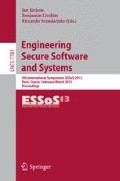Abstract
The increasing official use of security protocols for electronic voting deepens the need for their trustworthiness, hence for their formal verification. The impossibility of linking a voter to her vote, often called voter privacy or ballot secrecy, is the core property of many such protocols. Most existing work relies on equivalence statements in cryptographic extensions of process calculi. This paper provides the first theorem-proving based verification of voter privacy and overcomes some of the limitations inherent to process calculi-based analysis. Unlinkability between two pieces of information is specified as an extension to the Inductive Method for security protocol verification in Isabelle/HOL. New message operators for association extraction and synthesis are defined. Proving voter privacy demanded substantial effort and provided novel insights into both electronic voting protocols themselves and the analysed security goals. The central proof elements are described and shown to be reusable for different protocols with minimal interaction.
Access this chapter
Tax calculation will be finalised at checkout
Purchases are for personal use only
Preview
Unable to display preview. Download preview PDF.
References
Klein, G., Nipkow, T., Paulson, L. (eds.): The Archive of Formal Proofs, http://afp.sf.net
Abadi, M., Fournet, C.: Mobile Values, New Names, and Secure Communication. In: Proc. of the 28th ACM SIGACT-SIGPLAN Symposium on Principles of Programming Languages (POPL 2001), pp. 104–115. ACM Press (2001)
Bella, G.: Formal Correctness of Security Protocols. Information Security and Cryptography. Springer (2007)
Bella, G.: Inductive study of confidentiality: for everyone. Formal Aspects of Computing, 1–34 (2012)
Bella, G., Massacci, F., Paulson, L.C., Tramontano, P.: Formal Verification of Cardholder Registration in SET. In: Cuppens, F., Deswarte, Y., Gollmann, D., Waidner, M. (eds.) ESORICS 2000. LNCS, vol. 1895, pp. 159–174. Springer, Heidelberg (2000)
Bella, G., Paulson, L.C.: Mechanical Proofs about a Non-Repudiation Protocol. In: Boulton, R.J., Jackson, P.B. (eds.) TPHOLs 2001. LNCS, vol. 2152, pp. 91–104. Springer, Heidelberg (2001)
Blanchet, B.: An Efficient Cryptographic Protocol Verifier Based on Prolog Rules. In: Proc. of the 14th IEEE Computer Security Foundations Workshop (CSFW 2001), pp. 82–96. IEEE Press (1998)
Butin, D., Bella, G.: Verifying Privacy by Little Interaction and No Process Equivalence. In: SECRYPT, pp. 251–256. SciTePress (2012)
Chadha, R., Ciobâcă, Ş., Kremer, S.: Automated Verification of Equivalence Properties of Cryptographic Protocols. In: Seidl, H. (ed.) ESOP 2012. LNCS, vol. 7211, pp. 108–127. Springer, Heidelberg (2012)
Delaune, S., Kremer, S., Ryan, M.: Verifying privacy-type properties of electronic voting protocols. Journal of Computer Security 17(4), 435–487 (2009)
Delaune, S., Ryan, M., Smyth, B.: Automatic Verification of Privacy Properties in the Applied pi Calculus. In: Karabulut, Y., Mitchell, J., Herrmann, P., Jensen, C.D. (eds.) Trust Management II. IFIP, vol. 263, pp. 263–278. Springer, Boston (2008)
Fujioka, A., Okamoto, T., Ohta, K.: A Practical Secret Voting Scheme for Large Scale Elections. In: Zheng, Y., Seberry, J. (eds.) AUSCRYPT 1992. LNCS, vol. 718, pp. 244–251. Springer, Heidelberg (1993)
Kremer, S., Ryan, M.: Analysis of an Electronic Voting Protocol in the Applied Pi Calculus. In: Sagiv, M. (ed.) ESOP 2005. LNCS, vol. 3444, pp. 186–200. Springer, Heidelberg (2005)
Martina, J.E., Paulson, L.C.: Verifying Multicast-Based Security Protocols Using the Inductive Method. In: Workshop on Formal Methods and Cryptography (CryptoForma 2011) (2011)
Paulson, L.C.: Isabelle. LNCS, vol. 828. Springer, Heidelberg (1994)
Paulson, L.C.: The Inductive Approach to Verifying Cryptographic Protocols. Journal of Computer Security 6, 85–128 (1998)
Ryan, M.: Keynote: Analysing security properties of electronic voting systems. In: Erlingsson, Ú., Wieringa, R., Zannone, N. (eds.) ESSoS. LNCS, vol. 6542, pp. 1–14. Springer (2011)
Author information
Authors and Affiliations
Editor information
Editors and Affiliations
Rights and permissions
Copyright information
© 2013 Springer-Verlag Berlin Heidelberg
About this paper
Cite this paper
Butin, D., Gray, D., Bella, G. (2013). Towards Verifying Voter Privacy through Unlinkability. In: Jürjens, J., Livshits, B., Scandariato, R. (eds) Engineering Secure Software and Systems. ESSoS 2013. Lecture Notes in Computer Science, vol 7781. Springer, Berlin, Heidelberg. https://doi.org/10.1007/978-3-642-36563-8_7
Download citation
DOI: https://doi.org/10.1007/978-3-642-36563-8_7
Publisher Name: Springer, Berlin, Heidelberg
Print ISBN: 978-3-642-36562-1
Online ISBN: 978-3-642-36563-8
eBook Packages: Computer ScienceComputer Science (R0)

